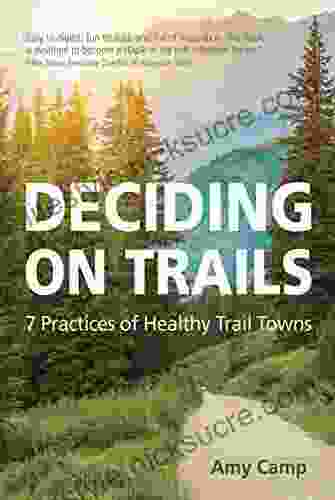Culture and Health: Applying Medical Anthropology to Improve Healthcare Outcomes

4.1 out of 5
| Language | : | English |
| File size | : | 2479 KB |
| Text-to-Speech | : | Enabled |
| Enhanced typesetting | : | Enabled |
| Print length | : | 514 pages |
| Screen Reader | : | Supported |
Health is not just a biological state but also a social and cultural construct. The way we define health, perceive illness, and access healthcare are all influenced by our culture. Medical anthropology, a subfield of anthropology that focuses on the relationship between culture and health, provides valuable insights into these complex interactions. By applying medical anthropological principles, healthcare providers can improve healthcare outcomes, reduce health disparities, and provide more culturally competent care.
The Importance of Culture in Health
Culture plays a significant role in shaping our health beliefs and behaviors. It influences how we perceive symptoms, seek treatment, and comply with medical recommendations. For example, in some cultures, it is common to believe that certain illnesses are caused by supernatural forces, while in others, they are seen as a result of natural causes. These beliefs can impact how people seek treatment and can lead to delays in diagnosis and care.
Culture also influences our dietary preferences, physical activity levels, and other health-related behaviors. In some cultures, for example, it is common to eat large meals at night, while in others, it is more common to eat smaller meals throughout the day. These dietary differences can have a significant impact on weight, cholesterol levels, and other health outcomes.
Medical Anthropology in Practice
Medical anthropologists use ethnographic methods to study the relationship between culture and health. They spend extended periods of time in communities, observing and interviewing people to learn about their health beliefs and behaviors. This research can provide valuable insights into the challenges and opportunities for improving healthcare in different cultural contexts.
Medical anthropologists have conducted research on a wide range of health topics, including:
- Health disparities
- Access to healthcare
- Patient-provider communication
- Cultural competence in healthcare
- Health promotion and disease prevention
- Global health
This research has helped to identify the ways in which culture can affect health and has led to the development of more effective healthcare interventions.
Improving Healthcare Outcomes
By applying medical anthropological principles, healthcare providers can improve healthcare outcomes for patients from diverse cultural backgrounds. Here are a few examples:
- Culturally competent care: Culturally competent healthcare providers are aware of and respectful of the cultural beliefs and practices of their patients. They tailor their care to the specific needs of their patients, taking into account their cultural beliefs about health and illness, their preferred language, and their communication style.
- Patient-centered care: Patient-centered care is an approach to healthcare that focuses on the individual needs of the patient. Healthcare providers who practice patient-centered care take the time to listen to their patients, understand their concerns, and develop a treatment plan that is tailored to their specific needs. This approach is particularly important for patients from diverse cultural backgrounds, who may have different health beliefs and values than the healthcare provider.
- Health promotion and disease prevention: Health promotion and disease prevention programs can be tailored to the specific needs of different cultural groups. For example, a health promotion program that aims to reduce obesity may need to be adapted to take into account the dietary preferences and physical activity levels of the target population.
By applying medical anthropological principles, healthcare providers can provide more effective and culturally competent care, which can lead to better health outcomes for patients from diverse cultural backgrounds.
Medical anthropology is a valuable tool for improving healthcare outcomes and reducing health disparities. By understanding the relationship between culture and health, healthcare providers can provide more culturally competent care, tailor interventions to the specific needs of their patients, and develop more effective health promotion and disease prevention programs. As the world becomes increasingly diverse, medical anthropology will play an increasingly important role in improving healthcare for all.

4.1 out of 5
| Language | : | English |
| File size | : | 2479 KB |
| Text-to-Speech | : | Enabled |
| Enhanced typesetting | : | Enabled |
| Print length | : | 514 pages |
| Screen Reader | : | Supported |
Do you want to contribute by writing guest posts on this blog?
Please contact us and send us a resume of previous articles that you have written.
 Fiction
Fiction Non Fiction
Non Fiction Romance
Romance Mystery
Mystery Thriller
Thriller SciFi
SciFi Fantasy
Fantasy Horror
Horror Biography
Biography Selfhelp
Selfhelp Business
Business History
History Classics
Classics Poetry
Poetry Childrens
Childrens Young Adult
Young Adult Educational
Educational Cooking
Cooking Travel
Travel Lifestyle
Lifestyle Spirituality
Spirituality Health
Health Fitness
Fitness Technology
Technology Science
Science Arts
Arts Crafts
Crafts DIY
DIY Gardening
Gardening Petcare
Petcare Rob Fisher
Rob Fisher Rosalind Wiseman
Rosalind Wiseman Johan Norberg
Johan Norberg Silvia Botros
Silvia Botros Iain Pardoe
Iain Pardoe Laurie A Watkins
Laurie A Watkins Eric T Knight
Eric T Knight Amy Brown
Amy Brown Danny Dreyer
Danny Dreyer David Elkington
David Elkington Krystal Sutherland
Krystal Sutherland Christina Kamp
Christina Kamp Jeff Martone
Jeff Martone Rodney M Howard Browne
Rodney M Howard Browne Rachel Gurevich
Rachel Gurevich Sarah Sumbal
Sarah Sumbal Brian Pace
Brian Pace Martin Williams
Martin Williams Elise Christie
Elise Christie Andy Singleton
Andy Singleton Byron Nelson
Byron Nelson Tabitha Suzuma
Tabitha Suzuma The 60 Minutes Summary
The 60 Minutes Summary Alan I Marcus
Alan I Marcus Clotaire Rapaille
Clotaire Rapaille Susan White
Susan White Ronda Rousey
Ronda Rousey Dr Elizabeth Cherevaty Nd Rac
Dr Elizabeth Cherevaty Nd Rac Ray Mancini
Ray Mancini Donovan Hohn
Donovan Hohn Tamora Pierce
Tamora Pierce Robb Walsh
Robb Walsh Martin Pollizotto
Martin Pollizotto Kenneth P Stephens
Kenneth P Stephens Umer W
Umer W Dima Zales
Dima Zales Jan E Stets
Jan E Stets Jean Van T Hul
Jean Van T Hul Rose Mannering
Rose Mannering Lizabeth Hardman
Lizabeth Hardman Joseph Mcmoneagle
Joseph Mcmoneagle American Baseball Coaches Association
American Baseball Coaches Association Karen Deerwester
Karen Deerwester Richard Wagamese
Richard Wagamese David Burch
David Burch Amber O Neal Johnston
Amber O Neal Johnston Jack Ewing
Jack Ewing Tahlia Kirk
Tahlia Kirk Sarah Dessen
Sarah Dessen John Maxwell Wood
John Maxwell Wood Joe E Harvey
Joe E Harvey Temple Grandin
Temple Grandin L Frank Baum
L Frank Baum Dr Scott A Johnson
Dr Scott A Johnson Amber Smith
Amber Smith Jenny Landreth
Jenny Landreth Mark Stallard
Mark Stallard John Ferrell
John Ferrell Garrett M Fitzmaurice
Garrett M Fitzmaurice Bridget Ericsson
Bridget Ericsson Sarah Woodbury
Sarah Woodbury Kathy A Zahler
Kathy A Zahler Pico Iyer
Pico Iyer Rob Antoun
Rob Antoun Dan Abnett
Dan Abnett Derek Thompson
Derek Thompson Suzanne Stabile
Suzanne Stabile Jack Falla
Jack Falla Sian Warriner
Sian Warriner Summer Michaud Skog
Summer Michaud Skog Amante P Marinas
Amante P Marinas Lady Antiva
Lady Antiva Nikhil Bhardwaj
Nikhil Bhardwaj Vinod Kumar Khanna
Vinod Kumar Khanna Michael Abayomi
Michael Abayomi Eugenia Viti
Eugenia Viti Harley Reid
Harley Reid Steven Charleston
Steven Charleston Amy Adele Hasinoff
Amy Adele Hasinoff Swede Burns
Swede Burns Jennifer Margulis
Jennifer Margulis Michael Cosgrove
Michael Cosgrove Lars Andersen
Lars Andersen Shaun Gallagher
Shaun Gallagher Zeshan Qureshi
Zeshan Qureshi Tom Taulli
Tom Taulli Nina Freudenberger
Nina Freudenberger Anthony Horowitz
Anthony Horowitz James P Kelly
James P Kelly Joellen Patterson
Joellen Patterson Erik Qualman
Erik Qualman K M Shea
K M Shea Mariano Anaya
Mariano Anaya Helena P Blavasky
Helena P Blavasky Joseph Conrad
Joseph Conrad Sean Gibson
Sean Gibson Joe Dan Lowry
Joe Dan Lowry Anna B Doe
Anna B Doe Tom Deck
Tom Deck Andy Hunt
Andy Hunt Paul Kockelman
Paul Kockelman Amara Charles
Amara Charles Philippa Langley
Philippa Langley Devin Olsen
Devin Olsen Redmond O Hanlon
Redmond O Hanlon James Mullaney
James Mullaney Mitt Romney
Mitt Romney Jerry D Moore
Jerry D Moore Denise Ni
Denise Ni Amie Kaufman
Amie Kaufman Therese A Rando
Therese A Rando Chris Carlsson
Chris Carlsson Isabella Krystynek
Isabella Krystynek Shannon O Bourne
Shannon O Bourne Amby Cooper
Amby Cooper Deborah J Rumsey
Deborah J Rumsey Kathleen M Stacy
Kathleen M Stacy Rick Deutsch
Rick Deutsch Mark Worden
Mark Worden Amber Lee Sellers
Amber Lee Sellers Jonathan Law
Jonathan Law Julie Schacht Sway
Julie Schacht Sway Michael Ondaatje
Michael Ondaatje Thom Hartmann
Thom Hartmann Don Mann
Don Mann Ryan Gray
Ryan Gray Amy Baldwin
Amy Baldwin Jayson Gaddis
Jayson Gaddis Dmv Test Bank
Dmv Test Bank Traci Gormley
Traci Gormley Melody Schreiber
Melody Schreiber Amit Saha
Amit Saha Grant Dever
Grant Dever Gia Giasullo
Gia Giasullo Spike Dykes
Spike Dykes Stanley I Greenspan
Stanley I Greenspan Jason Thompson
Jason Thompson Leslie Sansone
Leslie Sansone Sandra Bardwell
Sandra Bardwell Henry A Zumbrun 2
Henry A Zumbrun 2 Angela Moore
Angela Moore George Bernard Shaw
George Bernard Shaw Wade Rouse
Wade Rouse Sarah Morgan Haydock
Sarah Morgan Haydock Test Masters
Test Masters Laini Taylor
Laini Taylor Dave Hanson
Dave Hanson Randy Schultz
Randy Schultz Brian Kateman
Brian Kateman Don Bowers
Don Bowers Claudia J Carr
Claudia J Carr Paul Wieland
Paul Wieland Rick Stanton
Rick Stanton Paul Graham
Paul Graham Michael Winkelman
Michael Winkelman Neville Goddard
Neville Goddard Naomi Oreskes
Naomi Oreskes Sandra T Barnes
Sandra T Barnes Mark Taylor
Mark Taylor Sheena Johnstone
Sheena Johnstone David Guymer
David Guymer J Stephen Jones
J Stephen Jones Kristine Kathryn Rusch
Kristine Kathryn Rusch Robyn Davidson
Robyn Davidson Erin Chack
Erin Chack Ignatius Donnelly
Ignatius Donnelly Cole Hersowitz
Cole Hersowitz Joseph Klaits
Joseph Klaits Tyler Simmons
Tyler Simmons Kate Fox
Kate Fox Kate Parham Kordsmeier
Kate Parham Kordsmeier Amy B Middleman
Amy B Middleman Amy Camp
Amy Camp Chloe Gong
Chloe Gong Candy Verney
Candy Verney Howard J Meditz
Howard J Meditz Steven C Hayes
Steven C Hayes Jack Tupp
Jack Tupp Kezia Endsley
Kezia Endsley Roman Gelperin
Roman Gelperin Jessica Cunsolo
Jessica Cunsolo Julie Barlow
Julie Barlow Amy Perry
Amy Perry Bill Carter
Bill Carter Tim Marshall
Tim Marshall Shanna Cunning
Shanna Cunning Sharon K Zumbrunn
Sharon K Zumbrunn Marshall Goldsmith
Marshall Goldsmith Pav Bryan
Pav Bryan Reinhold Messner
Reinhold Messner Eric Zweig
Eric Zweig Paul Kaplowitz
Paul Kaplowitz John L Field
John L Field Elizabeth S Gilbert
Elizabeth S Gilbert Holly Herrick
Holly Herrick Charles Hall
Charles Hall Matthew L Martin
Matthew L Martin Theresa Y Wee M D
Theresa Y Wee M D Wolf Moon
Wolf Moon Joseph P Weir
Joseph P Weir Sarah J Maas
Sarah J Maas Amber Foster
Amber Foster Dolores Kong
Dolores Kong Kresley Cole
Kresley Cole Liz Fosslien
Liz Fosslien Anthony Haynes
Anthony Haynes Julie Mosier
Julie Mosier Clancy Cavnar
Clancy Cavnar Hadley Wickham
Hadley Wickham Buck Tilton
Buck Tilton Trevor Day
Trevor Day Jocelyn Goodwin
Jocelyn Goodwin Frank Nappi
Frank Nappi Donna Williams
Donna Williams Helen E Fisher
Helen E Fisher Andy Couturier
Andy Couturier Jeanne Ryan
Jeanne Ryan Patrick O Sullivan
Patrick O Sullivan Dr Bob Rotella
Dr Bob Rotella Cody Monk
Cody Monk Tracy Lorraine
Tracy Lorraine Michael Parker Pearson
Michael Parker Pearson Don Stradley
Don Stradley Amelia Freer
Amelia Freer Louise Bates Ames
Louise Bates Ames Jeff Gaudette
Jeff Gaudette Jonathan Bartlett
Jonathan Bartlett E T Bryant
E T Bryant Mark Turley
Mark Turley Laura Slinn
Laura Slinn Craig Larman
Craig Larman Cookie O Gorman
Cookie O Gorman Marco Ferrero
Marco Ferrero Sheri Van Dijk
Sheri Van Dijk Victoria Richards
Victoria Richards P Aarne Vesilind
P Aarne Vesilind Stephen Barr
Stephen Barr Ananda Lowe
Ananda Lowe David Salsburg
David Salsburg Katherine Kurtz
Katherine Kurtz Robert Melillo
Robert Melillo American Math Academy
American Math Academy Art Star
Art Star David Yoon
David Yoon Norman Doidge
Norman Doidge Ellie Wood
Ellie Wood Joan Freeman
Joan Freeman Alan Margot
Alan Margot John Lukacs
John Lukacs Kathleen Glasgow
Kathleen Glasgow Dan Schlossberg
Dan Schlossberg James W Williams
James W Williams Dana Obleman
Dana Obleman A Sorority Of Mothers
A Sorority Of Mothers Marina Robb
Marina Robb Cordelia K Castel
Cordelia K Castel Jack Weatherford
Jack Weatherford Peter Hayes
Peter Hayes Nicholas A Christakis
Nicholas A Christakis Brittany Clair
Brittany Clair Marisa Anne Bass
Marisa Anne Bass Joel Cotton
Joel Cotton Jacob Bronowski
Jacob Bronowski Tanya Turner
Tanya Turner Nisha Garg
Nisha Garg Jack Nisbet
Jack Nisbet Philip Gibson
Philip Gibson Timothy Malcolm
Timothy Malcolm Christopher Cousteau
Christopher Cousteau Camille Glenn
Camille Glenn Laekan Zea Kemp
Laekan Zea Kemp Josiah Hesse
Josiah Hesse K F Breene
K F Breene Antonio R Damasio
Antonio R Damasio Malba Tahan
Malba Tahan Tom Colicchio
Tom Colicchio Brian Klaas
Brian Klaas Courtney Defeo
Courtney Defeo Jack Freeman
Jack Freeman Md Mahady Hasan
Md Mahady Hasan Erica T Lehrer
Erica T Lehrer Frederick Lenz
Frederick Lenz William Stillman
William Stillman Amelia Edith Huddleston Barr
Amelia Edith Huddleston Barr Amiee Mueller
Amiee Mueller Maria Youtman
Maria Youtman Nikala Smith
Nikala Smith Edward J Denecke
Edward J Denecke Gal Dem
Gal Dem Cathy Williams
Cathy Williams Ashley Scott
Ashley Scott Jonathon Miller Weisberger
Jonathon Miller Weisberger Jeremy J Baumberg
Jeremy J Baumberg Josephine Atluri
Josephine Atluri Nicholeen Peck
Nicholeen Peck Larry K Brendtro
Larry K Brendtro Michaela Riva Gaaserud
Michaela Riva Gaaserud Stephen M Barr
Stephen M Barr Catherine Dees
Catherine Dees Alex Polyakov
Alex Polyakov Paul Schwartz
Paul Schwartz Saleh Alkhalifa
Saleh Alkhalifa Michael R Poll
Michael R Poll Joseph Howse
Joseph Howse Vicki Hearne
Vicki Hearne Amir Alexander
Amir Alexander Ruth Nestvold
Ruth Nestvold Amy Mccready
Amy Mccready Jessica Hatcher Moore
Jessica Hatcher Moore Muhammad Vandestra
Muhammad Vandestra Amie Lands
Amie Lands Amrita Pande
Amrita Pande Ruth M Tappen
Ruth M Tappen Bethanne Kim
Bethanne Kim Amber Zygutis
Amber Zygutis Stephen Goodwin
Stephen Goodwin Steve Greenberg
Steve Greenberg Valerie Bass
Valerie Bass Bruce Dowbiggin
Bruce Dowbiggin Amber Lia
Amber Lia Tavi Gevinson
Tavi Gevinson Julie Caplin
Julie Caplin Kasie West
Kasie West Doug Peterson
Doug Peterson Eric E Bowne
Eric E Bowne Autumn Jordon
Autumn Jordon Jake Maddox
Jake Maddox Sandra Luna Mccune
Sandra Luna Mccune Mac Fortner
Mac Fortner Paul Dickson
Paul Dickson Stephen J Collier
Stephen J Collier Gerald Corey
Gerald Corey Jim Santos
Jim Santos James E Packer
James E Packer Michael Reichert
Michael Reichert Terry Wieland
Terry Wieland Mark W T Harvey
Mark W T Harvey Tijan
Tijan Jennifer S Kelly
Jennifer S Kelly Guillaume Haeringer
Guillaume Haeringer Erika Napoletano
Erika Napoletano Amy Bizzarri
Amy Bizzarri Kathy Spratt
Kathy Spratt Kate Tietje
Kate Tietje H Bedford Jones
H Bedford Jones C W Lockhart
C W Lockhart Jason Borte
Jason Borte Arlene Blum
Arlene Blum Jean Rose
Jean Rose Eric Tyndall
Eric Tyndall Jean Christie Ashmore
Jean Christie Ashmore Heather Macfadyen
Heather Macfadyen Oscar Baechler
Oscar Baechler William Bohan
William Bohan Janet Engle
Janet Engle Gail Maccoll
Gail Maccoll Sonia Hartl
Sonia Hartl Trent Shelton
Trent Shelton Christopher Harlan
Christopher Harlan Emma Mae Jenkins
Emma Mae Jenkins J L Weil
J L Weil June Cl Tan
June Cl Tan Alexandrea Weis
Alexandrea Weis Marit Weisenberg
Marit Weisenberg Kyle Hunt
Kyle Hunt J Marin Younker
J Marin Younker Carlo Buzzichelli
Carlo Buzzichelli Adam Cort
Adam Cort Susanna Heli
Susanna Heli Randall E Schumacker
Randall E Schumacker Lisa Zimmer Hatch
Lisa Zimmer Hatch Nick Kolenda
Nick Kolenda Jd Mader
Jd Mader Dom Amore
Dom Amore Rich Rousseau
Rich Rousseau Sue Monk Kidd
Sue Monk Kidd Josh Taylor
Josh Taylor Chris Irons
Chris Irons Peter Worley
Peter Worley Andrey Ryanskiy
Andrey RyanskiyK D
 Stephenie Meyer
Stephenie Meyer Elizabeth Lim
Elizabeth Lim American Psychological Association
American Psychological Association Amira Mikhail
Amira Mikhail Sterling Test Prep
Sterling Test Prep Chad Starkey
Chad Starkey Cynthia Gabriel
Cynthia Gabriel Md Rezowan Ahmed
Md Rezowan Ahmed Deborah Lipsky
Deborah Lipsky Victor J Stenger
Victor J Stenger Joe Dante
Joe Dante William Glasser M D
William Glasser M D Alex Stone
Alex Stone Jameson M Wetmore
Jameson M Wetmore William G Dever
William G Dever Charles J Alsheimer
Charles J Alsheimer Chad Ford
Chad Ford Don Orwell
Don Orwell Mike Adamick
Mike Adamick Heidi J Larson
Heidi J Larson Stanley J Farlow
Stanley J Farlow Gary Wiener
Gary Wiener Jon Bonnell
Jon Bonnell Jenni Hicks
Jenni Hicks Theodore Sider
Theodore Sider C L Simchick
C L Simchick Deborah Vinall Psyd Lmft
Deborah Vinall Psyd Lmft Rosanna Davison
Rosanna Davison Brendan Leonard
Brendan Leonard Meikang Qiu
Meikang Qiu Douglas Wilson
Douglas Wilson Ana And Jack Hicks
Ana And Jack Hicks Jeffrey Steadman
Jeffrey Steadman Joe Nickell
Joe Nickell Matthew Lombardi
Matthew Lombardi Cheri Rae
Cheri Rae Amelia Parker
Amelia Parker Michelle Newhart
Michelle Newhart Kumo Kagyu
Kumo Kagyu Desi Northup
Desi Northup Wendy Margolis
Wendy Margolis Ned Vizzini
Ned Vizzini Pinky Mckay
Pinky Mckay Victoria Wood
Victoria Wood Shalabh Aggarwal
Shalabh Aggarwal Pamela Lynn
Pamela Lynn Nathan Belofsky
Nathan Belofsky Ruta Nonacs
Ruta Nonacs Django Paris
Django Paris Topher Donahue
Topher Donahue Theresa I Soto
Theresa I Soto Kris Leonard
Kris Leonard John Bingham
John Bingham Jan Marie Mueller
Jan Marie Mueller Gina Chen
Gina Chen Charles Thompson
Charles Thompson Warren B Powell
Warren B Powell David Grinspoon
David Grinspoon Diane Greer
Diane Greer Ned Seaton
Ned Seaton David Ranney
David Ranney Vince Kotchian
Vince Kotchian Lisa Maloney
Lisa Maloney Anne Chambers
Anne Chambers Eugene C Toy
Eugene C Toy Robert W D Ball
Robert W D Ball John Jacobs
John Jacobs Derrick Jensen
Derrick Jensen Benjamin Jelen
Benjamin Jelen Tom Patri
Tom Patri John A Buehrens
John A Buehrens William Rosen
William Rosen Robert A Weinberg
Robert A Weinberg Richard Cohen
Richard Cohen Patricia L Papernow
Patricia L Papernow Christine Fanthome
Christine Fanthome Paul Oliver
Paul Oliver Sean Go
Sean Go Tim Hornbaker
Tim Hornbaker Kieron Gillen
Kieron Gillen Thomas J Whalen
Thomas J Whalen Ken Chaddock
Ken Chaddock Amy Bleuel
Amy Bleuel Fred Pyrczak
Fred Pyrczak Torey L Hayden
Torey L Hayden Joseph Wayne Smith
Joseph Wayne Smith Shere Hite
Shere Hite Toni Tone
Toni Tone Stephen Walker
Stephen Walker Christopher E Larsen
Christopher E Larsen Peter Larson
Peter Larson John Mcpherson
John Mcpherson Candida Lawrence
Candida Lawrence Amy Blakeslee
Amy Blakeslee Glenn Stout
Glenn Stout Catherine Ryan Gregory
Catherine Ryan Gregory Vivian Vande Velde
Vivian Vande Velde Kevin Stiegelmaier
Kevin Stiegelmaier
Light bulbAdvertise smarter! Our strategic ad space ensures maximum exposure. Reserve your spot today!

 Edgar Allan PoeThe American Medical Association's Guide for Becoming a Teen: A Comprehensive...
Edgar Allan PoeThe American Medical Association's Guide for Becoming a Teen: A Comprehensive... Benjamin StoneFollow ·11.2k
Benjamin StoneFollow ·11.2k Julio Ramón RibeyroFollow ·12.2k
Julio Ramón RibeyroFollow ·12.2k Warren BellFollow ·2.8k
Warren BellFollow ·2.8k Sammy PowellFollow ·5.9k
Sammy PowellFollow ·5.9k Vernon BlairFollow ·8.1k
Vernon BlairFollow ·8.1k Matt ReedFollow ·4.9k
Matt ReedFollow ·4.9k Paul ReedFollow ·9k
Paul ReedFollow ·9k Eli BrooksFollow ·10.3k
Eli BrooksFollow ·10.3k

 Ira Cox
Ira CoxUnveiling the Hidden Gem: Moon, Virginia - A Washington...
Nestled within the picturesque...

 Jorge Luis Borges
Jorge Luis BorgesThe Ultimate Survivalist's Medical Guide: A Comprehensive...
In the realm of...

 Henry Green
Henry GreenDavid Douglas: Exploring the Natural History of the...
David Douglas was a...

 Eric Hayes
Eric HayesUnderstanding Citizenship in a Globalized World: A...
Citizenship is a complex and multifaceted...

 Will Ward
Will WardUnveiling Research Real Talk: Navigating the Labyrinth of...
Research, the...
4.1 out of 5
| Language | : | English |
| File size | : | 2479 KB |
| Text-to-Speech | : | Enabled |
| Enhanced typesetting | : | Enabled |
| Print length | : | 514 pages |
| Screen Reader | : | Supported |












